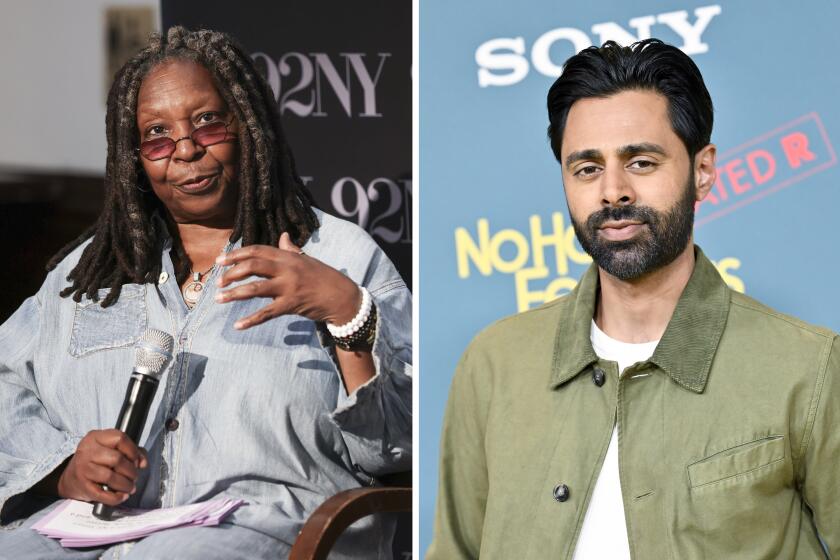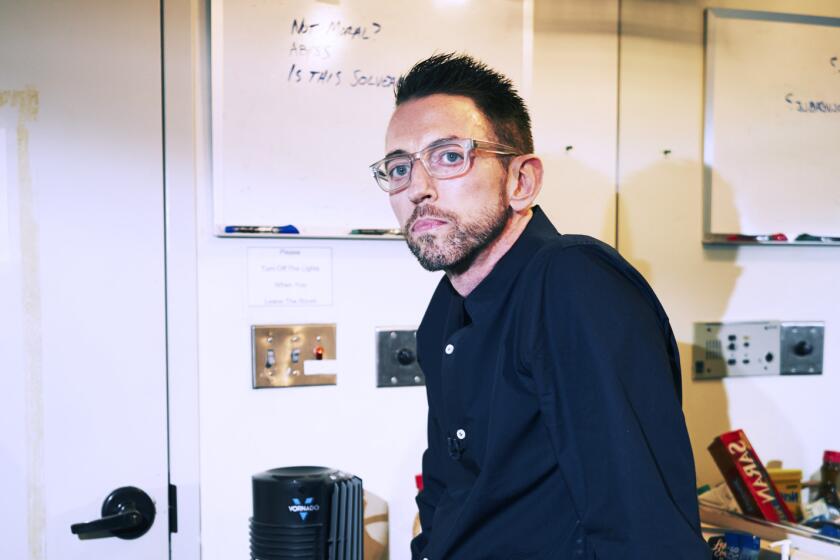Commentary: L.A. comics share the secret of political comedy — ‘everything is political’
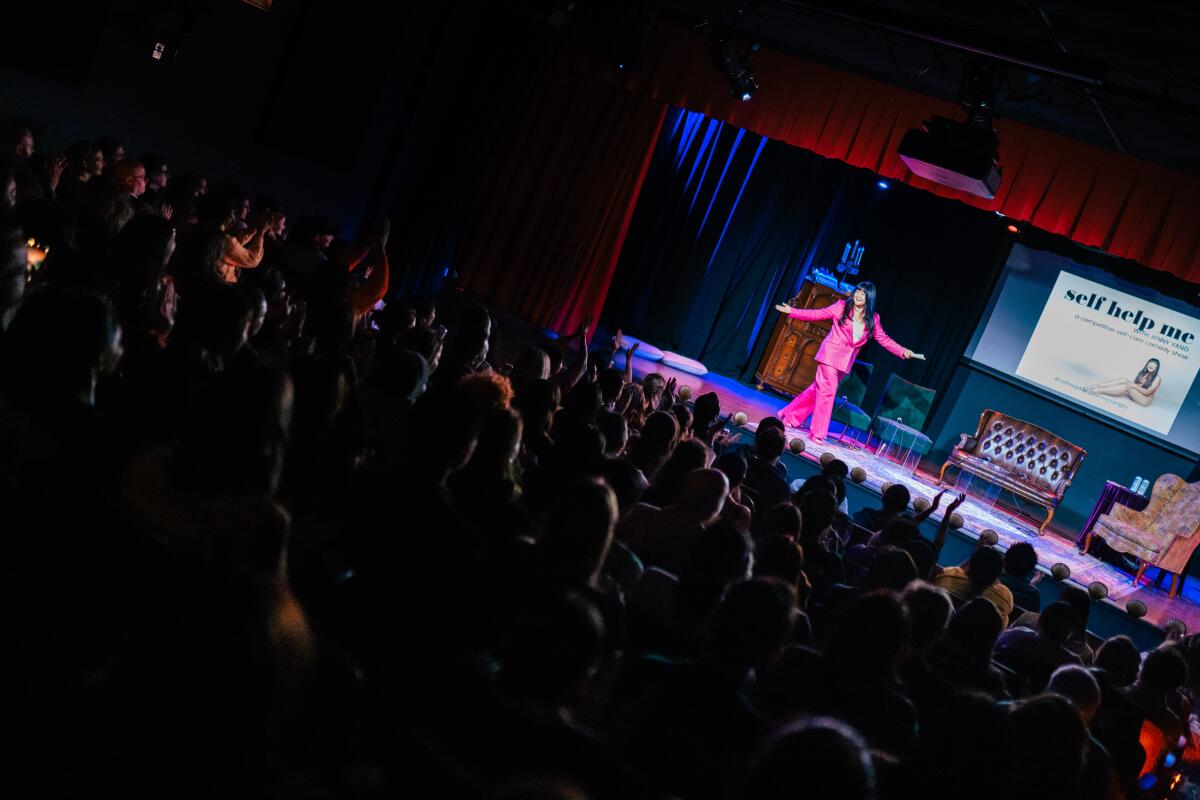
- Share via
During a recent show at the venerable Thursday stand-up haven Peacock — at Atwater Village’s classiest watering hole, Club Tee Gee — Patton Oswalt dropped in and remarked, “We’ve got about eight years, right?” regarding how soon the world will be coming to an end. This gallows humor was met with a big room laugh, probably because of how excruciatingly true it feels at the moment and over the last few years.
The world is on fire from climate change, democracy everywhere feels under the gun, corporate greed seems at a very transparent, all-time high. With all of that in mind, to be a political comedian these days seems more daunting than it has been in quite some time, perhaps even more so than the Dubya Bush years.
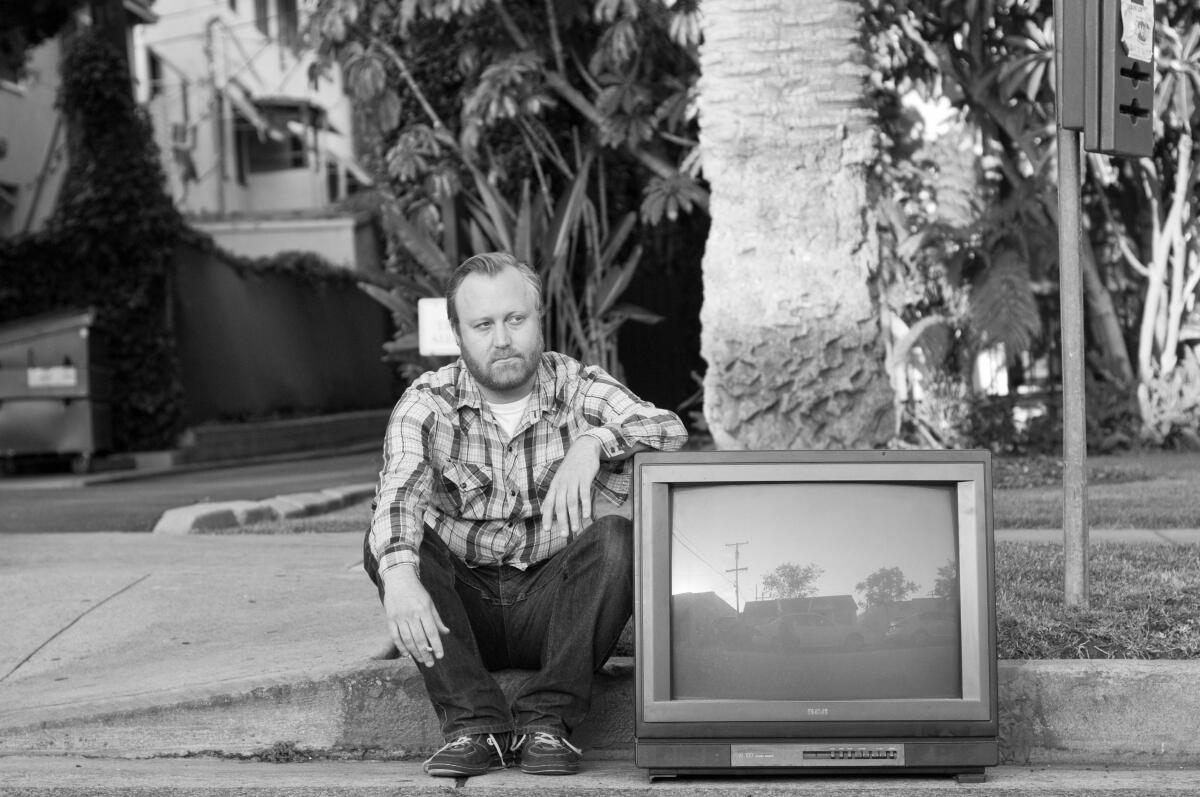
“I don’t know what it means to be a political comedian,” retorts L.A. comedian James Fritz.
Fritz made his way from the fertile comedy grounds of Chicago several years ago and has been a favorite of the L.A. comedy scene for a while now and a voice of fiery clarity when it comes to anything political. “I do political jokes. I do drinking jokes. I do relationship jokes. I do jokes about my family. But the sooner you realize that in this country everything is political, the saner you’ll be,” he said.
Fritz doesn’t really care about labels, despite wearing his beliefs on his well-worn sleeves, “I think if you set out to BE POLITICAL it comes across as false. You don’t have to look for the politics.” There is an undeniable politicization of every single thing around us at all times, “Sports are political. Religion is political. Barbie is political. Hell, your beer is political.”
Cultural divisions and tribalism pervade so much in current-day America that one could reasonably wonder when exactly we weren’t at each other’s throats (yet another popular premise for comedians in the 2020s). Political comedy hinges on sending up these divisions between people and the distance between them (or in some cases, how actually closer/more alike we are than not). At the same time, edgelord-y, anti-woke comedians such as the hosts of “Legion of Skanks” reaffirm divisions as they’re diametrically opposed comedians such as Fritz. So, why even joke about politics these days? Why would a comedian risk hinging their comedy on a potentially divisive belief or stance they have?
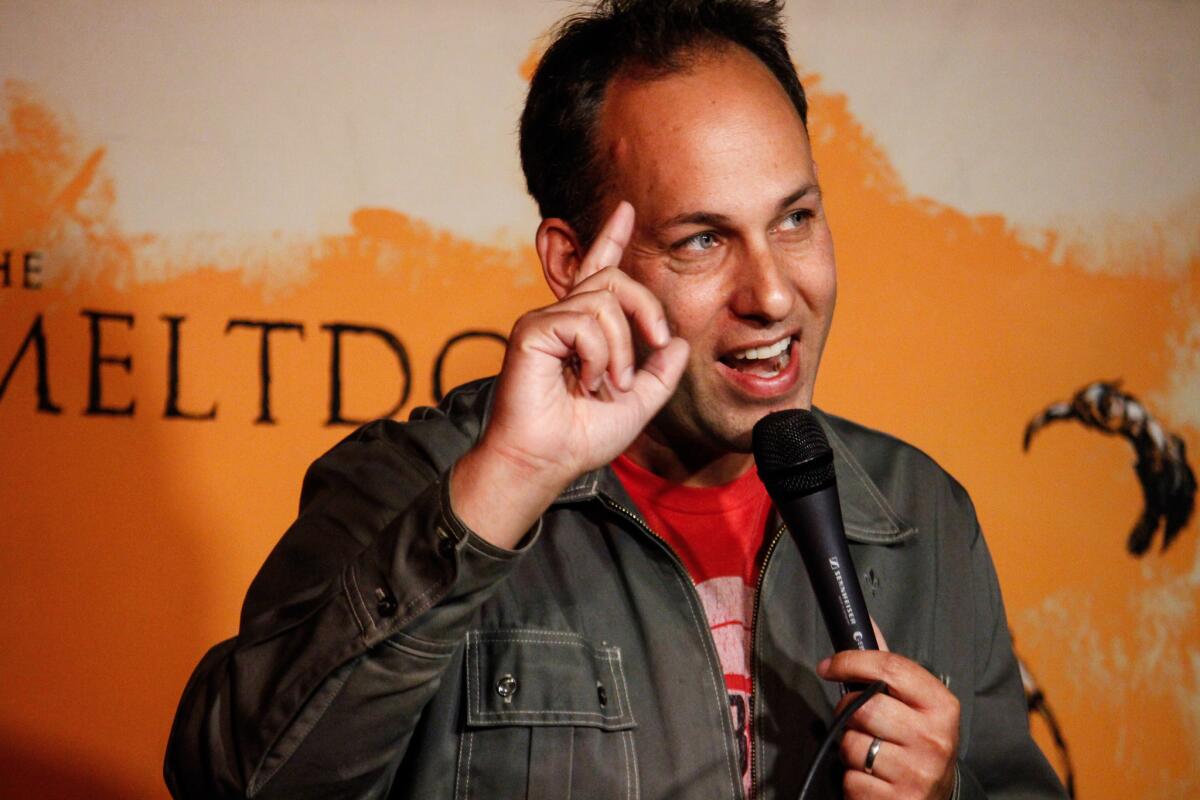
“Face the abyss and talk about it because people are bringing that through the doors,” said comedian Nato Green about comedically exploring the burning issues in the zeitgeist. Green, a Bay Area-based union organizer by day and a traveling comedian by night (he thankfully plays Los Angeles often), self-identifies as a political comic as well as an optimist. Nato was brought up reading and reveling in political cartoons from when he was a child and for him, there is relief, hope, catharsis in doing political comedy, especially at times where all feels lost. Even though he is highly involved in state-level politics and is a highly respected organizer for several massive unions, he does not read “Das Kapital” for relief.
Believing that amazing things in life can be just as surprising as their counterparts, Green chooses to buck the system with such innovative, satirical acts as sending U.S. Rep. Nancy Pelosi a 7-foot tall spine made out of Styrofoam right after Trump got elected. “People have told me that my albums got them through deep depression, my material worked its way into a curriculum.” His bit titled “How White Are Jews?” got taught in a class about race and identity.
Even with comedians who don’t identify as political, the existential pressure cooker of today bakes their politics into their material. Jenny Yang doesn’t want any label other than “comedian,” but because she comes from a background as a political organizer, you can expect jokes about racism, patriarchy, and capitalism to find their way into her sets. Ironically, she got out of politics and into comedy just so she could be more personal and vulnerable with what she wanted to talk about (i.e., anything other than politics). The police shooting murder of Michael Brown in Ferguson, Mo., brought her activist roots back into the forefront in her daily life, which is when she decided to actually bring her politics into her comedy.
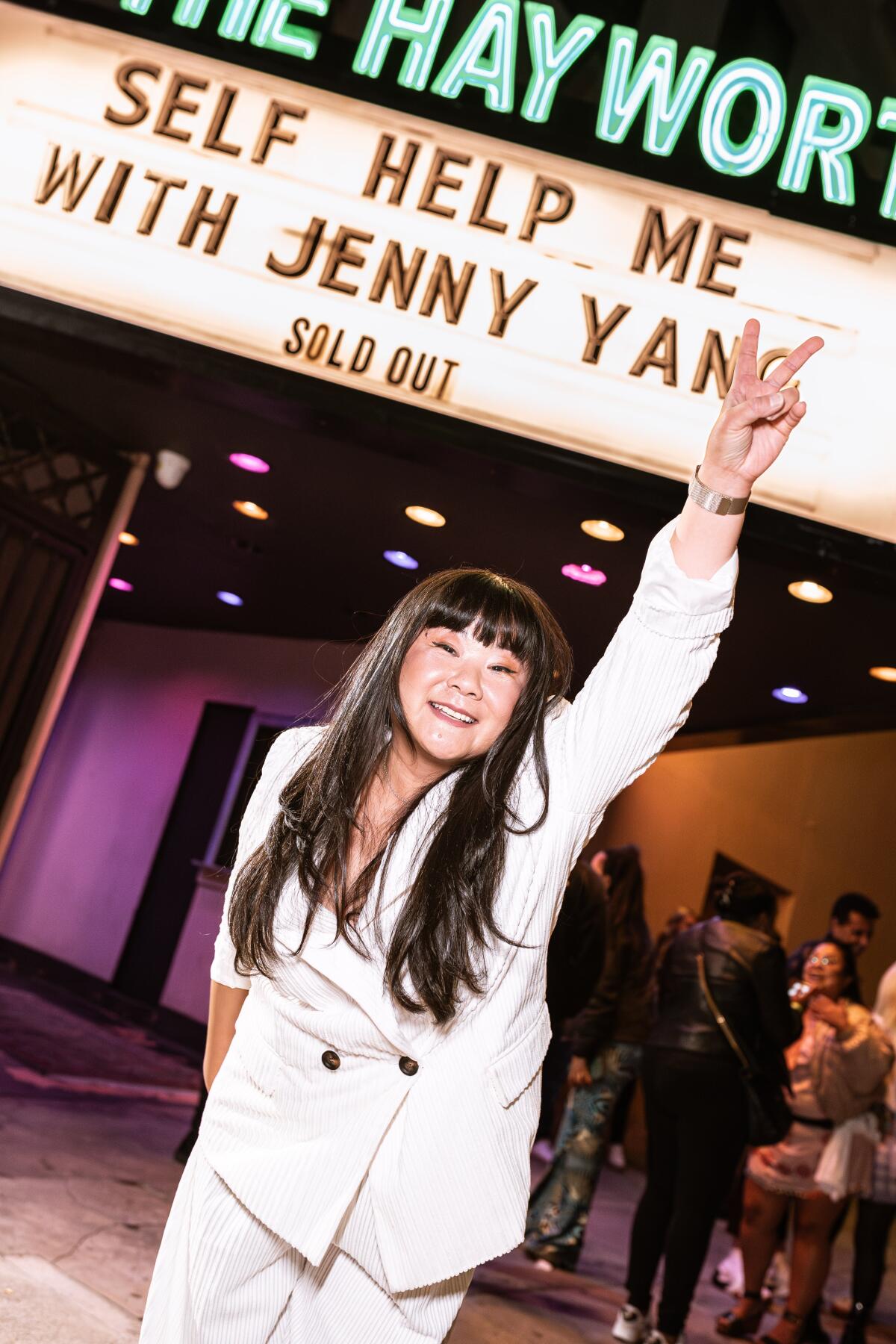
Again, Yang believes that if you want the widest audience, you might not want to be labeled and subsequently be pigeonholed. To her point, Green firmly believes the label of “political comedian” has throttled his success. Similarly, Fritz doesn’t think calling former President Obama a war criminal back in Chicago while Obama was still in office helped his career. Yang would rather have crowds think of her as a comedian who cares about the world and, perhaps, reach more folks that way. Her satirical “competitive self-help comedy show” “Self Help Me” (which comes to the Dynasty Typewriter this month) that skewers all facets of the self-help-industrial-complex and her Fiancé Energy tour have sold quite well, often to the point where she sometimes opts for livestreaming just so more people can see her meticulously crafted comedy wares.
Corollary to Fritz’s philosophy of everything being political is every idea or notion feeling more volatile. How does one exactly touch on politics (i.e., everything/anything) when a think piece dissecting your jokes from either side of the aisle could go up just a few hours after your set?
“It all needs to be funny,” declares longtime “Jimmy Kimmel Live” writer Bryan Cook. Like Fritz, Cook has mastered the art of the rant. He never misses a beat for running anything or anyone through his comedic gauntlet if he can find great punchlines, especially since the starting point for much of his comedy is “stuff I’m mad about.”
“I have never understood how a comic can ever be comfortable standing onstage while an audience just CLAPS at something they said. You’ve got their attention, now go write a joke. That’s your job,” Cook said. Whilst the SAG-AFTRA strike continues, Cook spun off several minutes on why the AMPTP needs to be stopped to several applause breaks and howling laughs. He also, in the same set, set his sights on his own side, “I barely perform outside the good ol’ liberal bubble we all love so dearly, so it’s really fun to upset them. (I am a liberal, I just think we’re annoying).” Political comedy does indeed work best when it errs more on the side of comedy than being right.
Still, even if you do your due diligence to avoid being any sort of hack from any background, identity or affiliation, you run the risk of alienating people who have starkly differing views from yours on any given night. Ben Gleib, a nationally touring comedian who actually ran for president in 2020 and steers his comedy toward politics more than most folks, but does so in a carefully measured manner.
“The way I have found to be most effective while saying something political in my stand-up routine is to frame it in a way that comes from a humanistic place,” he said. “To try to find common ground in the set-up of the joke, and then make your point as cleverly and irrefutably as you can, once you have people on board, so that it’s very hard to deny the logic.”
Gleib often goes viral across social media for hitting back at political pundits such as Tomi Lahren and Charlie Kirk and debating them relentlessly, utilizing satirical wit to his advantage. Gleib takes a more diplomatic approach to his jokes than Cook, but he still aims for the comedy vis-à-vis irrefutable logic to win audiences over, “... I would rather just pepper the politics in a little bit and focus on the logic flow of what I’m saying to hopefully open up some minds who typically don’t see things the same way.”
Their success is a sobering reminder that, at a comedy show, many folks seek comfort and a bit of escapism from the looming threats to their way of life, both in the macro and micro sense, especially if it’s hearing about those very scary things. Even if the comedy gets preachy, Nato Green points out, “People go to church to be preached to.”
When asking Curtis Cook, no relation to Bryan, about the label of “political comedian,” he very starkly pointed out just how strange the moniker can really be. Cook, who has written for both seasons of the marvelously subversive “This Fool,” got to interview comedy legend and activist Dick Gregory in college:
“During the interview, he flat out told me that stand-up lacks efficacy and that comedy, like other kinds of entertainment, is something people only retrospectively point to as the catalyst for change when they want to sanitize the struggles of progress,” he recalls. “It felt a little like he was saying, ‘Yeah, sure, they say my comedy enacted change, but only to distract from how they killed all my activist friends who actually enacted change.”
More to Read
The biggest entertainment stories
Get our big stories about Hollywood, film, television, music, arts, culture and more right in your inbox as soon as they publish.
You may occasionally receive promotional content from the Los Angeles Times.
